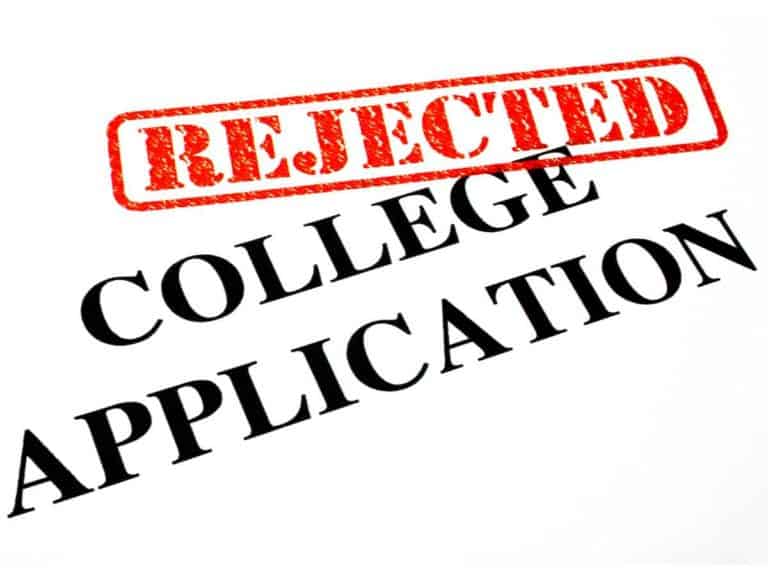Why Your Dream College Might Not Want You, Even with Perfect Grades
Many high schoolers feel that straight-A students go straight to their dream colleges.
Believe it or not, students at the top of their class are not always at the top of college admissions officers’ list.
Life is fair, after all!
However, postsecondary institutions that tend to reject overqualified applicants are less competitive ones, the kinds that accept mostly B and C students.
It’s all about yield rate protection.
In some instances, less selective colleges believe that more prestigious schools, such as those with single-digit acceptance rates, will better serve high-performing students’ need for rigorous academic programs.
Worry not if you’re an above-average teen whose top-choice college is average.
You can do certain things to prove that the institution you like is the best fit for you.

Got a High GPA? Bye!
Competitive colleges are less likely to accept non-competitive applicants.
Meanwhile, non-competitive colleges are less likely to accept competitive applicants.
Your academic and non-academic profiles matter in college admissions, especially where a holistic review process is the policy, although they should go with the school’s preferences.
Your stellar GPA and test scores may hinder your acceptance to some not-so-competitive schools.
And there are varying reasons as to why.
Non-Competitive Colleges Still Want to Look Good
Accepting more students than would enroll is bad for the yield rate.
The yield rate is the percentage of students who enroll in a college after receiving an offer to matriculate.
According to the National Association for College Admission Counseling (NACAC), the national average yield rate for four-year institutions is 33% for private and 25% for public.
If fewer students than accepted choose to attend, then the college must be horrible!
Some college ranking sites also include the yield rate in their methodology, which makes prestigious colleges look even more prestigious — in most cases, the higher the yield rate, the more selective the school.
Profit is Vital for Keeping Colleges in Operation
A low yield rate may also cause higher education institutions to shut down.
Colleges need to fill the incoming first-year class because it ensures a steady flow of income through tuition and fees — they need money to operate, pay faculty and staff members, and invest in resources.
With only a few slots taken, colleges may have to merge classes or even dissolve programs.
Letting go of some teaching and non-teaching staff is also a likelihood.
College admissions officers must be wise in offering available slots to applicants; otherwise, they could be looking for jobs at other institutions the following admissions cycle.
A Diverse Campus is for Everyone’s Benefit
Diversity is not just having students from various racial and ethnic backgrounds.
It’s also about having students with various personal experiences, unique perspectives, individual belief systems, and distinctive things to contribute to the campus community.
A diverse campus is good as it allows for a better environment for everyone academically and socially.
Having only high-achieving students around can cause a dog-eat-dog atmosphere, and a well-rounded college experience is not just about getting a better GPA than one’s classmates.
That said, some overachieving students may get a rejection for a balanced campus.
It’s Plain to See: Another College is the Better Fit
Refrain from assuming that all college admissions officers at less selective colleges tend to turn straight-A students down because they are cold-hearted, jealous individuals.
A rejection letter can also come from a good place, even though it can cause a sucky feeling.
Perhaps they are well aware that top-performing students may find the academic programs and facilities they offer insufficient to help them create the career path they have in mind.
It’s important to remember that attending a best-fit school is everything.
Non-competitive colleges may feel that their more competitive counterparts may be able to better serve the academic needs of students exhibiting lots of promise and potential.

Show You’re More Than Just Your Perfect GPA
Fret not if an overachiever like you dreams of attending a less competitive college.
Filling your college list with only some of the most selective institutions in the land is not the only option to avoid the hurt of getting a denial from a non-competitive school of your liking.
You can prove those college admissions officers wrong!
Take note that they are not questioning your academic prowess since your grades, class rank, and SAT or ACT scores serve as testimonies of what you can do in the classroom.
What they are doubting is your sincerity in attending them when you’re Ivy League material.
Demonstrate Your Interest in Attending
Most elite colleges and universities don’t care about demonstrated interest.
On the other hand, many less competitive schools consider it a critical admissions factor.
Make the college at the top of your list see that you will grab the opportunity to attend if handed to you because you are not interested in going to a more prestigious option.
Take a campus tour, attend a local college fair, email an admissions officer or academic advisor, sign up for newsletters, contact an alumni member, or actively participate on the school’s Facebook page.
Anything that can prove you want no other college!
Highlight What You Can Contribute to and Get From the Campus
Colleges and students must mutually benefit from each other.
Check that the non-selective college of your dreams realizes that your unique characteristics and skills would make you a wonderful addition to the community.
Point out, too, what you can get from the institution in return.
Do you sincerely like the academic program it offers? Do you feel that its culture can help you achieve your career goals? Do you feel like you were born to attend it?
You can discuss these things and more in your emails and application essays.
Strengthen Other Application Components
Holistic colleges consider more than just academic performance in the review process.
They also look into various non-academic attributes.
From extracurricular activities to work experience, numerous things that happen outside the classroom (and sometimes also outside the campus) matter in the eyes of admissions officers at less competitive colleges.
Prove to them that overqualified individuals like you can offer more than just amazing grades.
It pays to carefully research a school’s values and priorities to get a much better idea of how you can modify your college application to suit its specific needs.
Disclaimer: The views and opinions expressed in this article are those of the authors and do not necessarily represent those of the College Reality Check.





